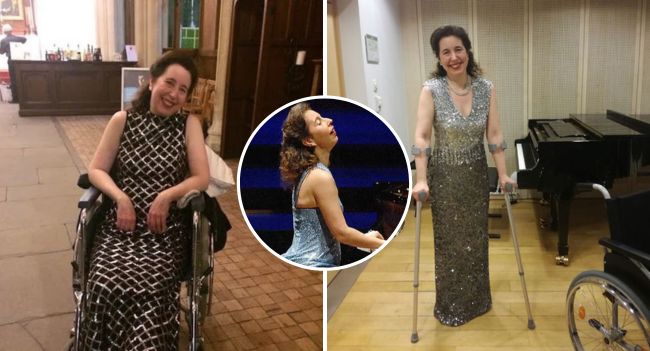Hewitt wasn’t going to bail on Oxford crowd, despite falling down a flight of stairs
Angela Hewitt is calling it a painful first.
After falling down some stairs about an hour and a half before a show at Oxford’s St. John the Evangelist Church last week, the renowned Ottawa pianist took the stage in a wheelchair — and performed through the pain.
“I knew right away it was a bad one, because I couldn’t put any weight on [my left foot],” Hewitt told CBC Radio’s All in a Day following the concert.
“I still can’t put any weight on that leg at all.”
‘Mentally I was able to play’
Hewitt was in Oxford to perform a prelude from Bach’s The Well-Tempered Clavier as part of her Bach Odyssey series.
She had been filming her rehearsal earlier in the day, and was on her way back to her room — dressed in her ball gown and heels, her arms full of bags — when she took her tumble.
But Hewitt is not, in her own words, a pianist who cancels easily.
I couldn’t disappoint the 450 people who turned up.– Pianist Angela Hewitt
“I’ve performed when I’ve had a fever of 104, and through stomach bugs when I haven’t eaten anything,” she said.
“I knew that mentally I was able to play. And the audience was arriving already, and I couldn’t disappoint the 450 people who turned up.”
So ice was put on her foot, someone found a wheelchair, and two large men lifted her on stage.
The audience gasped, she said, when they saw her.
“I explained that I wanted to play for them, but if the pain got to be too much that I would stop,” Hewitt said.
Dr. Theatre
Hewitt told All in a Day she couldn’t pedal with her left foot, and that after playing for two hours the pain was getting to be a bit much.
She credited something actors call “Dr. Theatre” for giving her what she needed to power on.
“You know, when the adrenaline gets going, a lot of the pain goes away. Somehow the adrenaline of performance gets you through, and then it’s afterwards that you feel it,” Hewitt said.
“If I were a world famous author or a film star, you know, you have ten people around you all the time [carrying your bags]. But us classical musicians are always expected to do things ourselves, and I’m a bit fed up!” she added, laughing..

Hewitt said she has no plans to change the performance because of her injury, except for the fact that the wheelchair may be joining her on stage for her next concert at Wigmore Hall.
She plans to get the foot X-rayed to make sure it isn’t broken, and she’s currently on crutches and spending time in bed.
Hewitt said she never considered cancelling, and in fact performed the same program 10 years ago on the day her mother died — and that was probably even harder.
“So when you have done that, you can do this,” she said.
ALWAYS THE UNEXPECTED
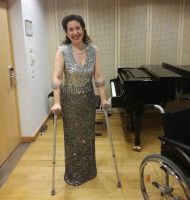
The new year started off so wonderfully with a four-day festival, organised by my Trasimeno Music Festival staff, in the Ca’ Sagredo Hotel on the Grand Canal in Venice. Their gorgeous Music Room was the venue for four concerts in four days–a solo recital to start off with; then an evening of romantic music and poetry on an Italian/Venetian theme with actor Roger Allam and myself; an ensemble from the acclaimed Baroque orchestra “Il Pomo d’oro” and mezzo-soprano Giuseppina Bridelli; and finally a concert with cellist Enrico Bronzi. The whole thing was magical and a huge success, with 130 people coming from all over the world. I have no idea whether I’ll repeat it, but we will remember it for a long time. Then it was off to Berlin to record the second-last of my Beethoven CDs for Hyperion. Very satisfying work. Then to Bochum to play de Falla’s Nights in the Gardens of Spain, and to renew my acquaintance, after far too long, with conductor Hans Graf.
On January 24th I performed Book I of Bach’s Well-Tempered Clavier for the first time in ten years. Ninety minutes before that recital I fell down some steps that I simply didn’t see, going into the sacristy of the church in Oxford where the concert was held. Fortunately I was carrying a lot of stuff so didn’t put my arms out when I fell. But I broke my left foot. The pain was terrible, but I played anyway–as I did in London’s Wigmore Hall, two nights later. It took a while to diagnose exactly what was wrong. So now I’m on crutches for several months, and need help everywhere I go. Fortunately I have a wonderful network of friends (largely thanks to my festival in Italy and the marvellous audience that comes there) who are putting themselves out to support me in my travels. Thank you so much to all of you! Only one recital had to be cancelled when the pain was still intense and the diagnosis not yet complete. Last week I made my official debut in Budapest, playing two concertos with Concerto Budapest and conductor Andras Keller. That was great, and I so enjoyed being there and meeting such kind people everywhere. I couldn’t go out much, but it didn’t matter.
So you never know. I am always very careful on steps, but those ones I simply didn’t see in time. There should have been a word of warning on the door, surely. And I was a little put out when the concert organisers got up to make an announcement before the recital that night (about toilets, the bar, parking…mundane things) and then said, “Please welcome Angela Hewitt” without saying one word about the fact that I would then be brought out in a wheelchair! A prime example of the famous British upper lip….? So I made somebody go out and tell them to say at least something–which the person then did, but only to say I had had an accident and that the audience needed to be patient, which I considered a gross understatement and not very gracious. Oh well….
Pianist Angela Hewitt is probably best known for her cycle of Bach recordings, a project started in 1994 and finished in 2005. To complete her mission, she added a recording of Bach’s The Art of the Fugue in 2014.
Angela Hewitt’s Musical Father
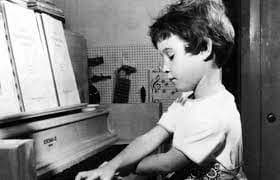
The young Angela Hewitt
Hewitt was born in Ottawa, Ontario, on 26 July 1958, daughter of Yorkshire-born Godfrey Hewitt. He was the choirmaster and organist at Christ Church Cathedral in Ottawa, and according to his daughter, “he was a great Bach player. I remember hearing him play those organ works, and the wonderful clarity that he brought to them—the joy, the sense of dance, the rhythm, and all the things that you need to play Bach well.”
Angela Hewitt Plays Bach’s Prelude and Fugue in B minor BWV 893
First Instruction
Hewitt began her piano studies at the age of three with her mother. “She was a wonderful musician,” explains Hewitt. “She had gone to study the organ with my father but she was a pianist in her own right and a choir director, too.”
According to Angela Hewitt, her mother “was a lovely and natural musician. Everything she did was always musical. And she was especially very good with children. When she gave me daily lessons, evidently I asked for them. I liked the lessons so much when she started teaching me on a real piano at the age of 3.”
J.S. Bach: Piano Concerto in D Minor, BWV 1052 (Angela Hewitt, piano; CBC Vancouver Orchestra; Mario Bernardi, cond.)
Other Interests
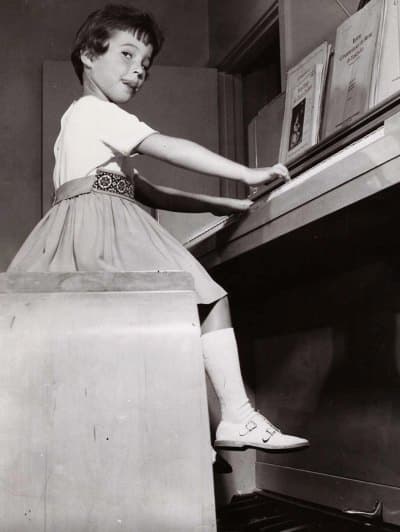
Angela Hewitt at age 4 © angelahewitt.com
However, Hewitt had a well-rounded musical education as she also studied the violin with Walter Prystawski, recorder with Wolfgang Grunsky, and ballet with Nesta Toumine in Ottawa. Eventually, however, she left the violin behind and focused on the piano.
As she explained in an interview, “At one point, I did play them side-by-side. When playing Bach’s keyboard music, you sometimes have to think about the accentuation and articulation you would get from bowing a stringed instrument. So I am happy to have studied the violin.”
Angela Hewitt Plays Bach’s Prelude and Fugue in G Major, BWV 884
Childhood Memories
Hewitt related a lovely anecdote about her earliest training in classical music. “When I was a kid,” she explained in an interview, “my mother would tie up the gates of my play area with loads of knots because I was always escaping and running down the road. I’d spend the whole day undoing those knots so that I could run down the street. Maybe that’s why I like doing a lot of Bach fugues—they’re very complicated pieces with four or five different voices at once. I like taking those pieces and making them sound easy. It’s just in my nature.”
Spirituality
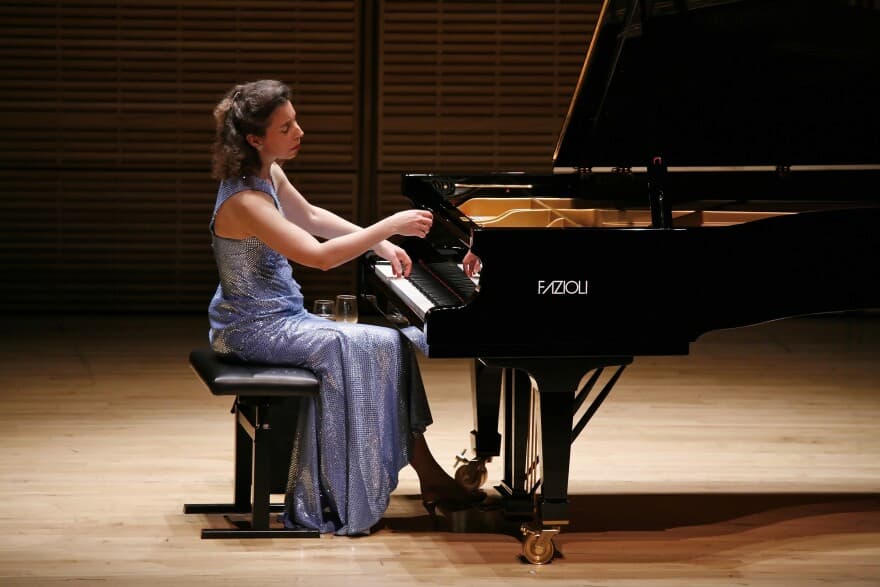
© Richard Termine
Then and now, church music and the compositions of Bach have always been at the center of Hewitt’s aesthetic. For her, “the compositions of Bach are a great expression of faith. Perhaps more than any other composer, people turn to his music in times of trouble when they need comfort. Bach’s music conveys a message of great joy and hope.”
Angela Hewitt Plays Bach’s Prelude and Fugue in B Major, BWV 892
Hewitt and Bach
Hewitt’s relationship with Bach has developed and deepened over the years. “Bach never wrote a note, sacred or secular, that wasn’t to the glory of God. So when you play Bach it gives a sense of purpose behind the music that one might not otherwise have.” To Hewitt, “you don’t play Bach in a trivial way. It’s not expressive in a nyah-nyah way. It is pure sound, pure expression.” Hewitt strongly believes that you can perform Bach properly without being a believer, “but you have to have a sense that for Bach that was the case. The strength of purpose has to be there; the fact that he looked forward to eternal life.”
Bach on modern Instruments
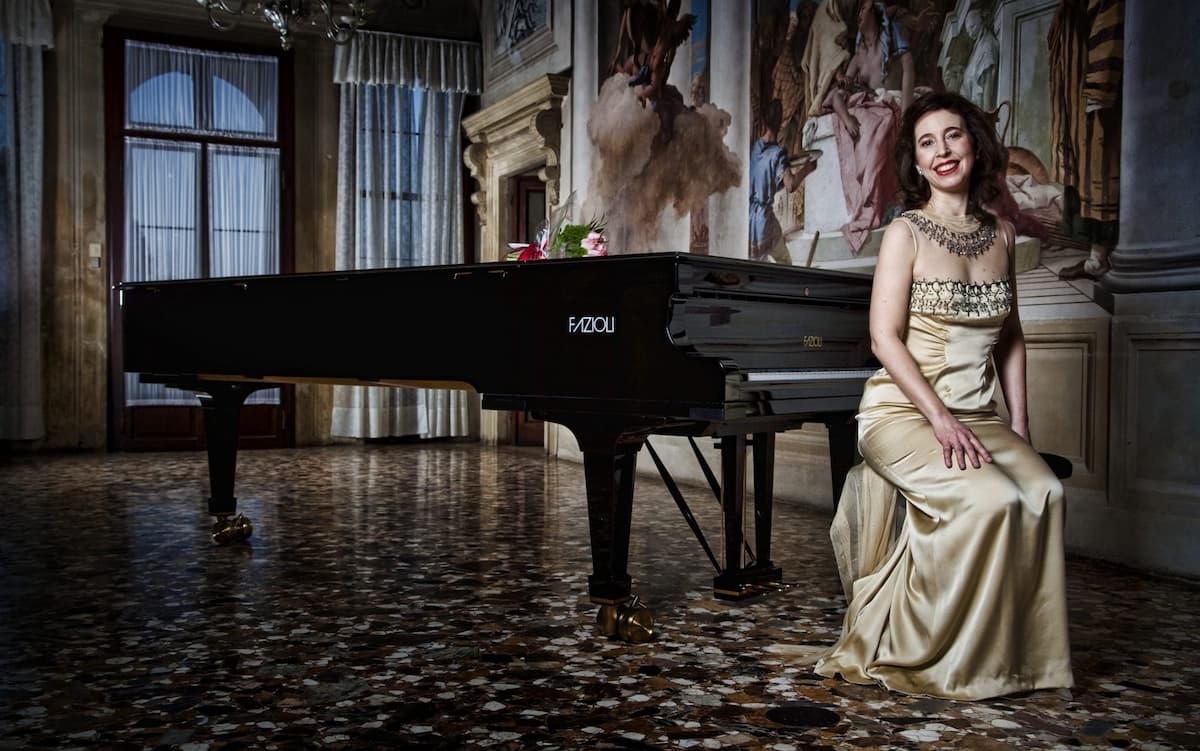
Angela Hewitt
In the same sense, Hewitt never apologized about playing Bach on the piano. “I knew that the pieces were written for the harpsichord but the piano was my instrument. And after all, Bach is the greatest composer of all time.” Hewitt performed her first full-length recital at the age of nine at The Royal Conservatory of Music in Toronto, where she studied from 1964 to 1973 with Earle Moss and Myrtle Guerrero. She then went on to be a student of French pianist Jean-Paul Sevilla at the University of Ottawa.
